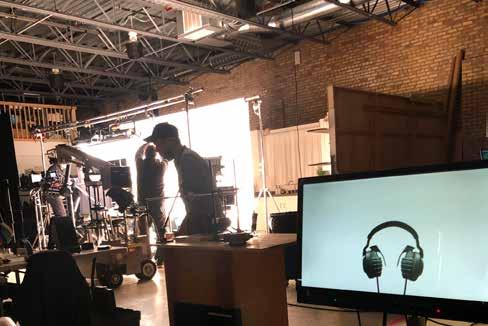
3 minute read
Meet the Researcher
Emerging Research Grants (ERG)
As one of the leading funding sources available for innovative research, HHF’s ERG program is critical. Without our support, scientists would not have the needed resources for cutting-edge approaches toward understanding, preventing, and treating hearing and balance disorders.
Advertisement
Ross Williamson, Ph.D
University of Pittsburgh
Williamson received his doctorate from the Gatsby Computational Neuroscience Unit, University College London, followed by postdoctoral training at Massachusetts Eye and Ear, Harvard Medical School. Currently an assistant professor in the departments of otolaryngology and neurobiology at the University of Pittsburgh, Williamson is a 2020 Emerging Research Grants recipient.
as a postdoc, I used some viral strategies to identify the different brain areas that were targeted by a particular type of neuron. It turned out that these neurons connect with many areas simultaneously—including brain areas that regulate emotions, anxiety, and fear. Some subsequent work showed that these neurons also remained hyperactive after noise exposure, so looking at how this alters downstream connectivity seemed like an interesting next step.
i’ve always been obsessed with music. I grew up listening to the likes of Led Zeppelin and Pink Floyd, which naturally progressed into learning to play electric guitar. Trying to understand how guitar effects pedals worked led to a love of the mathematics behind signal processing.
i have tinnitus. The truth is it’s due to a misspent youth attending too many rock concerts. (I’m still obsessed with Phish and have seen them 50-plus times.) I’ve realized that tinnitus really affects everyone differently. I’m fortunate in that I can typically ignore my tinnitus, but many others do not have this luxury. I’m fascinated by the neural circuitry that underlies this kind of heterogeneity.
my formal academic training was largely quantitative (computer science, then theoretical neuroscience and machine learning). Because of this, whenever I get to actually experience neural data, either through hearing an electrophysiological recording or watching a two-photon imaging session, I’m always struck with this childlike wonder. I just love playing sounds to the brain and hearing/seeing it talk back to me—it’s so cool!
outside the lab my greatest passions are music, books, and bikes. I love the tactile sensation of reading a book or setting the needle down on a vinyl record. I think that most of my profound scientific thinking occurs with a soundtrack, or while seeking out hills on my road bike.
ultimately, I want to do good science that can make a difference. I hope that over the next decade my lab will have been able to contribute fundamental insight as to how different neural circuits process sound and how to repair these neural circuits when they go wrong.
Ross Williamson, Ph.D., is funded by donors to Hearing Health Foundation who designated their gifts for the most promising research. HHF sincerely thanks our community for supporting these projects that address the full range of hearing and balance science.
We need your help funding the exciting work of hearing and balance scientists. Please consider donating today to Hearing Health Foundation to support groundbreaking research.
Visit hhf.org/how-to-help.
6 Ways to Make an Impact Today and Tomorrow
You can make a meaningful difference in hearing loss research. Whichever method below you choose, every gift to Hearing Health Foundation (HHF) counts.
Check or credit card gifts online or by mail are easy and immediate. For more of an impact, schedule a monthly gift that helps sustain research without interruption.
Donating appreciated stock can reduce your tax bill. You receive a charitable tax deduction for the full value of the stock, and avoid paying taxes on the stock as it appreciates.
A charitable bequest in your will can be a more substantial gift if you are unable to donate today. If you do not have a will, create one for free at freewill.com/hhf. The De Francescos named HHF in their estate plans.
If you are in possession of life insurance policies that you no longer need, you can designate HHF as the beneficiary.
IRA distributions that begin when you turn 70 1/2 can be taxed as income, but if you choose to donate them to HHF, you avoid the penalty.
Retirement plan benefits left to heirs are more highly taxed than other assets. Make a meaningful gift to HHF instead, leaving lower-taxed assets to loved ones.
This publication is distributed for free through the generous support of our community. To learn more, visit hhf.org/how-to-help, email development@hhf.org, or call 212.257.6140.










